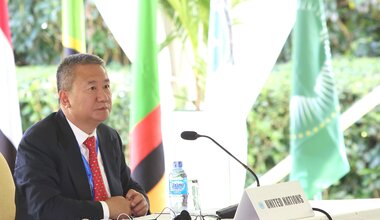Media Monitoring - OSESG-GL, 20 March 2015
UN envoy outlines progress in DR Congo from ‘shattered’ country to ‘proud nation’
Source: UN News Centre
New York, 19 March 2015 - The Democratic Republic of the Congo (DRC) is unified with a “clear, shared and celebrated” identity, the top United Nations envoy there told the Security Council today, as he briefed on the latest developments in the vast African nation.
“It is no longer at war, neither in transition. It is a proud nation,” said Martin Kobler, the Secretary-General’s Special Representative and head of the UN peacekeeping mission in DRC (MONUSCO). “When [the original mission in the country] MONUC arrived, some 15 years ago, the country was socially, economically and politically shattered. When MONUC arrived, the country was at civil war.”
Mr. Kobler, who was joined in briefing the Council by the Secretary-General’s Special Envoy for the Great Lakes Region, Said Djinnit, described the Government’s efforts to restore security, saying it had succeeded in freeing a large amount of territory from armed groups, which were now limited to the country’s eastern provinces.
“The overall security situation however is still not stable, let alone irreversible,” he said. “Many still live in fear of rape, fear of attack, fear of being robbed of already meagre possessions. This fear affects every aspect of daily life.”
He said more work was needed to reduce the threat from armed groups and violence against civilians to a level that can be effectively managed by Congolese institutions and to achieve stability through the establishment of functional, professional, accountable State institutions and strengthened democratic practices.
“Our combined efforts against the ADF, like the operations against the M23 two years ago, has forged a bond between the FARDC [national army] and MONUSCO soldiers: they are now brothers in arms,” said Mr. Kobler, stressing that the FDLR remained the biggest threat to peace and security in the Great Lakes region and stressing the need for joint efforts to tackle that threat.
Mr. Kobler noted that FARDC officers who had formerly commanded units with a credible history of human rights violations were brought in and the UN was forced to suspend participation in and support for operations under their command.
“The decision to suspend support is upholding indisputable values enshrined in the protection of human rights,” he said. “We want to support the fight against the FDLR and implement our human rights policy. We do not want to choose between fighting the FDLR or upholding human rights.”
 ONU
ONU



